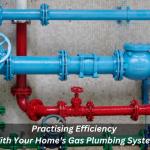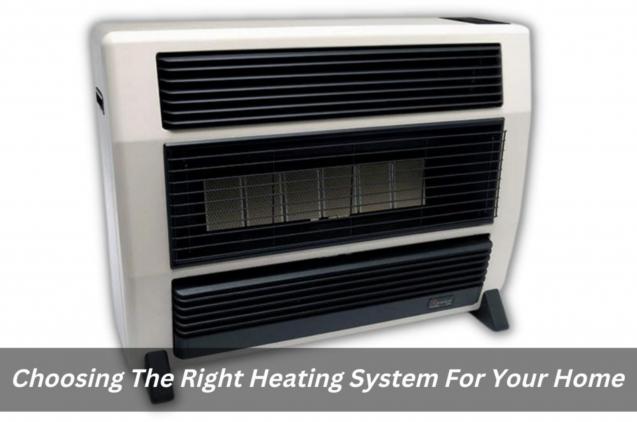
Practising Efficiency With Your Home's Gas Plumbing System
By Apex Gas Heater Services|January 05, 2023
Are you looking for ways to save money and conserve energy in your home’s gas plumbing system? Updating your gas hot water system is a great way to cut costs and water usage, decrease energy use, and reduce environmental impact.
Homeowners can take charge of their energy expenses by learning how to practice water efficiency with the gas plumbing system. After all, this is where a majority of the household’s energy flow rate cost comes from. Unfortunately, many people don't know that they can actively practice efficiency in their own homes.
Tapping into efficiencies with the gas plumbing system is easier than it might appear. In this article, we will discuss six easy steps that your home can take to ensure it maintains an efficient gas plumbing system for years to come, saving you both time and money in the long run.
Step 1: Identify energy loss areas in your house
The first step to improving the efficiency of your gas plumbing system is to identify any areas where energy is being lost. To do this, you will want to inspect all of your pipes, fixtures, and appliances for any signs of leaks or dry rot. If there are any cracks or gaps in the system, these should be sealed up promptly as they can cause significant energy loss.
In addition to inspecting your water pipes and fixtures, you should also check for any drafts in your house that may be causing energy loss. This is especially important if you live in an older home as old windows and doors often have air leaks that can lead to higher energy bills.
Step 2: Use energy-efficient fixtures & appliances
Once you have identified any energy loss areas in your house, it is time to start replacing old, inefficient fixtures and appliances with newer, energy-efficient models. Look for products that are certified as these will use less energy and provide your home with better performance.
Step 3: Balance your water pressure
Another way to improve the efficiency of your gas plumbing system is to balance the water pressure in your home. If the pressure is too high, it can cause a lot of wasted energy and water. To balance the pressure, you should install a pressure regulating valve on each pipe in your house. This will ensure that all of the fixtures receive an adequate amount of water while also reducing the amount of energy needed to supply it.
Step 4: Install more efficient water heating systems
You can further increase the efficiency of your natural gas plumbing and electric system by installing a more efficient water heating system. Tankless water heaters are a great choice to heat water as they use less energy than traditional tank heaters and provide hot water on demand. These systems are also much smaller in size which can save you valuable space in your home.
Step 5: Seal up any dry rot & leaks in the system
In order to maintain the efficiency of your gas plumbing system, it is important to seal up any dry rot or leaks in the system. This can be done by using a combination of caulking and epoxy putty. The caulking should be used around the edges of the pipes and fixtures while the epoxy putty can be used to fill any cracks or gaps that may have formed over time.
Step 6: Perform regular maintenance for efficiency
Finally, it is important to perform regular maintenance on your gas plumbing system in order to keep it running efficiently. This includes checking for leaks and inspecting all of your pipes, fixtures, and appliances on a regular basis. Doing so will help ensure that there are no hidden issues that could lead to energy loss and costly repairs in the future.
Make sure to have your gas or electricity system inspected by professional plumbing and gas services to avoid any problems. It is highly recommended to contact a fully licensed gas plumber for installation and repairs as they are trained professional gas fitters. Gas fitting services are specialized trades and services related to the installation, maintenance, repair, and removal of gas equipment in residential or commercial settings.
Homeowners can take charge of their energy expenses by learning how to practice water efficiency with the gas plumbing system. After all, this is where a majority of the household’s energy flow rate cost comes from. Unfortunately, many people don't know that they can actively practice efficiency in their own homes.
Tapping into efficiencies with the gas plumbing system is easier than it might appear. In this article, we will discuss six easy steps that your home can take to ensure it maintains an efficient gas plumbing system for years to come, saving you both time and money in the long run.
Step 1: Identify energy loss areas in your house
The first step to improving the efficiency of your gas plumbing system is to identify any areas where energy is being lost. To do this, you will want to inspect all of your pipes, fixtures, and appliances for any signs of leaks or dry rot. If there are any cracks or gaps in the system, these should be sealed up promptly as they can cause significant energy loss.
In addition to inspecting your water pipes and fixtures, you should also check for any drafts in your house that may be causing energy loss. This is especially important if you live in an older home as old windows and doors often have air leaks that can lead to higher energy bills.
Step 2: Use energy-efficient fixtures & appliances
Once you have identified any energy loss areas in your house, it is time to start replacing old, inefficient fixtures and appliances with newer, energy-efficient models. Look for products that are certified as these will use less energy and provide your home with better performance.
Step 3: Balance your water pressure
Another way to improve the efficiency of your gas plumbing system is to balance the water pressure in your home. If the pressure is too high, it can cause a lot of wasted energy and water. To balance the pressure, you should install a pressure regulating valve on each pipe in your house. This will ensure that all of the fixtures receive an adequate amount of water while also reducing the amount of energy needed to supply it.
Step 4: Install more efficient water heating systems
You can further increase the efficiency of your natural gas plumbing and electric system by installing a more efficient water heating system. Tankless water heaters are a great choice to heat water as they use less energy than traditional tank heaters and provide hot water on demand. These systems are also much smaller in size which can save you valuable space in your home.
Step 5: Seal up any dry rot & leaks in the system
In order to maintain the efficiency of your gas plumbing system, it is important to seal up any dry rot or leaks in the system. This can be done by using a combination of caulking and epoxy putty. The caulking should be used around the edges of the pipes and fixtures while the epoxy putty can be used to fill any cracks or gaps that may have formed over time.
Step 6: Perform regular maintenance for efficiency
Finally, it is important to perform regular maintenance on your gas plumbing system in order to keep it running efficiently. This includes checking for leaks and inspecting all of your pipes, fixtures, and appliances on a regular basis. Doing so will help ensure that there are no hidden issues that could lead to energy loss and costly repairs in the future.
Make sure to have your gas or electricity system inspected by professional plumbing and gas services to avoid any problems. It is highly recommended to contact a fully licensed gas plumber for installation and repairs as they are trained professional gas fitters. Gas fitting services are specialized trades and services related to the installation, maintenance, repair, and removal of gas equipment in residential or commercial settings.



